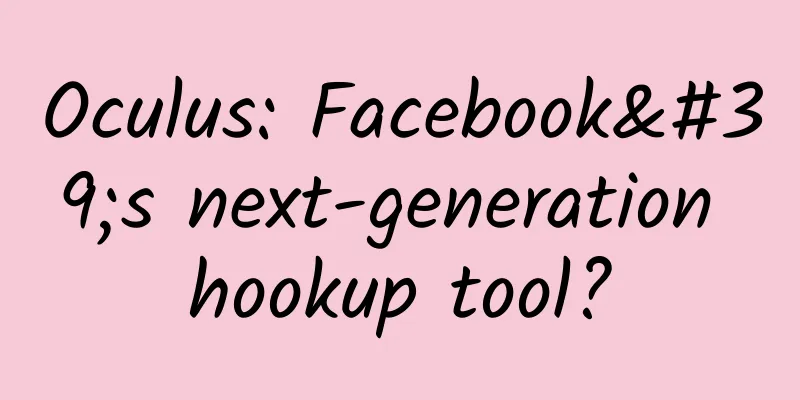Oculus: Facebook's next-generation hookup tool?

|
A while ago, a resignation letter was very popular in the Chinese Internet world. It just said: "The world is so big, I want to see it." Actually, the world is big and small. Last Friday (June 12), according to the Wall Street Journal, Facebook's virtual reality company Oculus released the company's first consumer preview version for gamers. On Thursday morning, Oculus showed the details of the consumer version of the head-mounted display. Oculus CEO Brendan Iribe announced that Oculus Rift will be officially available in the first quarter of next year. When we encounter Oculus products, the world becomes smaller in an instant. If you want to see the world, you don't have to go out to see it. You can go to Taobao and spend 100 yuan to buy a recliner, free shipping. Then buy a product similar to Oculus and wear it on your head. The world is right in front of you. You can go wherever you want to see it while lying at home. This is not a joke, nor is it a fantasy, but a way of life and work in the era of smart wearables. The smart wearable industry, triggered by Google Glass, is currently in a state of rapid fission and extension. Whether in terms of application or technology, smart wearable products are developing at a rapid pace. Why is the “mediocre” Oculus so popular? The development of virtual reality technology is as popular as the current smart watches and smart bracelets. Before Oculus's products, Samsung and Sony have launched similar virtual reality products, mainly used in gaming and entertainment; so it can be said that Oculus's products are not new and unique technologies, and compared with Microsoft's HoloLens and Google's Google glass, Oculus is very mediocre. However, this "mediocre" Oculus has recently attracted great attention. The key reasons are mainly the following: 1. Oculus has an influential godfather, Facebook, who paid a high price of 2 billion US dollars to support it. Last year, Facebook spent 2 billion US dollars to acquire Oculus VR. It can be said that this acquisition event has made virtual reality a new hot spot in the smart wearable industry. After being supported by the rich, Oculus has also attracted special attention from the outside world. In the field of virtual reality, companies such as Google, Microsoft, Sony, and Samsung Electronics have already made some arrangements. So, what is the reason for Facebook to spend 2 billion to support Oculus? As a company dominated by social networking, is it because it has seen the popularity of smart hardware products and hopes to cross over into the "hardware field"? The answer is obviously not. Moreover, I can basically assert that Facebook's purpose is still its social business, rather than tossing around the sales of a few hardware products. So, what is the purpose of Zuckerberg, the head of Facebook, spending 2 billion US dollars to acquire Oculus, a project that has not even figured out the commercialization of its products? Perhaps we can understand something from Zuckerberg's own expression, that is, "Virtual reality will be the next generation of computing platform. In addition to games, it will also play a huge role in online education, vocational training, family entertainment and other fields." In other words, Zuckerberg's purpose in acquiring Oculus is neither to devote himself to the sales of hardware products nor to be optimistic about the field of virtual reality games, but what he really cares about is his "hooking up" platform. I have mentioned in the article "Is Facebook's Internet of Things Reliable?" that Facebook's initial development was based on the social networking of college students, that is, it provided a relatively fast "hookup" platform for this group of young people who were in the period of high hormone secretion. Because this platform was full of college students, the targeting of a specific group of people greatly reduced the time for those who wanted to hook up to identify the background of the hookup object, so it achieved rapid growth among college students in the United States. Later, with the intervention of capital, higher requirements for the expansion of its business were put forward. At this time, in addition to some college students, various groups with interests and concerns about college students began to enter the market, including entering some other countries to act as an international "hookup" platform. So, how to make those who have already hooked up, or those who can't hook up, continue to stay on the Facebook platform? That is undoubtedly to continue to find "fun" for these people. So we saw that Facebook not only acquired Oculus, but also announced its entry into the Internet of Things field and the creation of an Internet of Things platform at the developer conference earlier this year. These series of actions actually have a common purpose, which is to allow users who come to the "hooking up" platform for any purpose to stay on it and to constantly do something on this platform instead of running to other platforms. Among them, virtual reality is a very critical technical means, especially for "hooking up" tools. It can be said that the introduction of smart wearable products such as Oculus VR will bring "magical" magic to the Facebook social platform. 1. For social networking. In today's era of big data, text-based social networking has brought trouble to many people who "hook up", that is, privacy is easily exposed. Including on Facebook's social platform, users' every move and interaction with different people will become a kind of "public" information, but this is contrary to the privacy motivation of "hooking up". Oculus VR makes this way of hooking up more "private" and "direct", which means that in the future, if you want to hook up, you no longer need to search on Facebook by typing, but can directly search in Oculus VR by voice with "pictures and facts". Firstly, it can allow some offline behaviors to be directly transferred online, and users can pay to lie on the bed and watch live, real-life strip shows, or the things played on Qvod; secondly, for some couples who are deeply in love and live in different places, wearing Oculus VR can at least meet their visual needs, although it cannot meet their physical needs. 2. For gaming and entertainment. There are still quite a few people on the planet who are obsessed with gaming and finding the value of their existence in the virtual world. These people are usually relatively young, which is the mainstream group on Facebook. So how to keep these people "sticky"? The key lies in whether we can provide them with more interesting "fun". Oculus VR is obviously the first choice. Compared with the current game control on the screen, Oculus VR brings an immersive experience that can eliminate external interference to the user to the greatest extent, allowing the user to "immersively" enter the role of the game to reflect the self-worth in the virtual world. For users, they only need to wear the matching smart wearable control device on their hands and move their arms and fingers to achieve various game controls. Moreover, this high-tech equipment you wear also protects your privacy, and no one knows what you are doing. Second, Oculus is also in a relationship with another wealthy boss, Microsoft. Oculus VR itself is in the hottest industry, that is, the smart wearable industry. On the one hand, it is supported by Facebook, a wealthy man in the technology field and a rising star, with a lot of money; on the other hand, it is in a relationship with Microsoft, a veteran star in the technology field. It is difficult for it not to become the focus of discussion in the technology field. Moreover, according to the information released by Oculus a few days ago, the Oculus head-mounted display will be available on Windows 10 and Xbox One, and the Xbox One controller will also be sold with the Oculus Rift. This obviously brings us several very important information. 1. Microsoft's ambition to enter the era of the Internet of Things. Although what we have seen so far is that the Oculus head-mounted display will be available on Windows 10, this seemingly insignificant information actually sends us an important signal that "Microsoft is working hard to seize and lay out the era of the Internet of Things." Microsoft was the only one that stood out in the PC Internet era, dominating the operating system market. However, it has been losing ground in the mobile Internet era. Both the previous Windows Mobile and the later Windows Phone systems debuted with great ambitions but ended in dismal failure. Microsoft was battered by Apple, a hardware company, and Google, a search company. One dominated the high-end market with its high-end closed system iOS, while the other occupied the market with its unscrupulous open system Android, leaving Microsoft at a loss. For Microsoft, missing out on the mobile Internet era is not terrible, because it is only a transitional era from the PC Internet to the Internet of Things. What really determines Microsoft's future fate is the upcoming Internet of Things era. It can be said that in the Internet of Things era, when all hardware and software facilities are Internet-based and digitized, higher requirements are placed on the stability, complexity, and security of the operating system. This is undoubtedly an innate advantage for Microsoft, which has been immersed in the operating system field, whether in terms of technology, experience, funds, channels, etc. The only shortcoming of Microsoft is that it is not down-to-earth. In other words, in the previous PC Internet era, all users learned and adapted to the operating system without much thought. It was a centralized era with Microsoft Windows operating system as the core. However, in the mobile Internet era, it is more of an era of building operating systems around users, an era of decentralization. For example, the core of Apple's IOS is how to make users feel comfortable in a simple and direct way; for example, Google's Android is a more direct and fully open platform. After each company takes it, it conducts targeted secondary development according to the needs of users in their respective market segments to adapt to and meet the needs of different users. Microsoft obviously did not adapt during this transition period, but after so many years of market exploration and education, Microsoft has realized this change and has also made changes. The operating system also jumped directly from Windows 8 to Windows 10. Perhaps many people did not understand why Microsoft jumped directly from 8 to 10 and omitted 9. In fact, it wanted to express that it would jump directly from the PC Internet to the Internet of Things era. It can only face the missed mobile Internet era, and more importantly, seize the larger Internet of Things era. One of the characteristics of the Internet of Things era is the diversification and fragmentation of smart hardware, unlike the relatively simple products in the PC Internet or mobile Internet era. For example, the product forms and distribution areas of smart wearables are diverse, which puts high demands on the system's diversified support and adaptive capabilities. In other words, your system is displayed in one way on the PC, but it needs another way on the smartphone, and it needs another interface display method on smart glasses. However, Microsoft has indeed made a lot of efforts in this regard, including the previous Microsoft smart bracelet, HoloLens virtual interactive device, and the current collaboration with Oculus VR. In fact, they are all doing one thing, which is to accumulate experience for its own operating system platform in the Internet of Things era, in order to improve the development of its operating system. 2. Offering the Xbox One controller is killing two birds with one stone. On the one hand, based on Oculus' current technical level, it is still unable to come up with a handheld touch device that can be linked with the device and has stable performance. Although the Oculus Touch wearable control technology based on itself was released at the press conference a few days ago, this technology can be said to be immature at present. Taking Oculus' current market entry point of gamers as an example, this group of people has very high requirements for the control accuracy and sensitivity of the equipment; on the other hand, they also have very high requirements for the responsiveness and stability of the system operation. Users in the game market are different from users in the "visual" aspect. Users in the "visual" aspect only need smooth playback and smooth images. However, game users are different. If there are flaws in stability, sensitivity, accuracy, etc., it will seriously affect their self-worth expression in the virtual world. So for the Oculus team, it is good enough to be able to make this product. The reason is simple. It is not easy to transform an idea or a prototype into a commercial application product while ensuring a good user experience. Especially for such head-mounted smart wearable products that are worn for a long time, any inadequate details will affect the user's wearing comfort. In addition, we need to develop games that fit the Oculus VR scene. From the Oculus press conference, although several games have been released, it can be said that this is just the beginning. As for the current game users, Oculus is far from being able to meet the huge game user group grafted on Facebook. Whether in terms of the breadth, depth, or difficulty of the games, there is still a long way to go. Therefore, for Oculus, finding a powerful lover is the most suitable choice, at least for the moment. On the one hand, Microsoft is also looking for partners to explore the field of IoT system platforms; on the other hand, it has strong operating system experience and technical strength; and Microsoft also has many years of experience in the gaming field, and can provide Oculus with the most convenient game control solution device, Xbox ONE. This product is Microsoft's third-generation home video game console, which is much more mature than Oculus VR products. For Microsoft, offering the Xbox One controller can be said to kill two birds with one stone, which can boost the sales of hardware devices and gain experience for its own system applications. However, for Oculus, it is more of a helpless move at the moment. Instead of choosing to cooperate with other manufacturers, it is better to cooperate with Microsoft, the boss of Facebook and its partner. Moreover, choosing Windows 10 can also solve more problems at the soft system application level for Oculus. The most critical one is the continuity and adaptability of the picture during the virtual reality display process. For example, when the user turns his head while playing the game, the picture at this time must be changed accordingly according to the user's behavior. Especially in a more sensitive perspective system, once the displayed picture and the eye's perspective response are directly misaligned, it will conflict with the user's perspective system, which will bring a very bad feeling. 3. Although Oculus is relatively "mediocre", it is a product that has truly entered commercial use. This means that the concept of Oculus VR products is nothing new or special. It can be said that it is a relatively ordinary concept in the field of smart wearables. The main reason why it has attracted attention is that in addition to the two factors mentioned above, another important factor is that it has truly brought this seemingly "ordinary" concept into commercial application. From products such as Google Glass and Microsoft HoloLens, we can see a common shadow, that is, these high-tech "artifacts" that seem very sci-fi and desirable, if they want to truly move from concepts to commercial applications, this road is full of hardships. Oculus VR products may represent the current situation of the entire smart wearable industry. It can be said that the smart wearable industry is an industry from 0 to 1, with no reference, no perfect industrial chain, and even consumers are still in a stage of vague cognition of what smart wearables are. Entrepreneurs in this field are exploring this cutting-edge technology industry with their own wisdom, creativity, and perseverance. Although most of the current products are imperfect to varying degrees, they still cannot stop the media spotlight or the enthusiasm of consumers. The same is true for Oculus VR products. If we only look at the hardware product level, this is a typical maker project, and the entire team lacks hardware technology and commercialization experience. It is foreseeable that the first generation of Oculus VR products, like some other smart wearable products, will have some flaws in the hardware itself; at the software level, there will also be problems to varying degrees in interactive control, virtual reality display interface, etc. However, the spirit of pushing new technology from the laboratory to commercial market applications is something worthy of admiration and support. An industry from 0 to 1, a product from 0 to 1, is itself a process of continuous exploration and improvement. Although the Oculus VR product seems "mediocre" in concept, it is a product from 0 to 1, whether it is the system, hardware, technology, application, etc., it is a process of construction. This commercialization process seems simple in theory, but it is not easy to implement. Perhaps this is also a factor that attracts a lot of attention to Oculus. However, the most important thing is the power of smart wearables. I have said many times that smart wearables have replaced mobile phones as the center of the world. One of the key technologies is virtual reality. It can be said that virtual reality is a technological trend full of charm and imagination. In the future, virtual reality will replace the current screen and we will enter an era without "screens". Oculus's application exploration will inevitably attract a lot of attention. Oculus Home is the key The core of Oculus is not the hardware product Oculus VR itself; its biggest goal is to build a developer platform similar to Apple Store; the only difference is that Oculus Home is currently a developer platform focusing on the gaming market segment. Just like Oculus invested 10 million US dollars to encourage and support game developers to enter, the purpose of this move is also to attract developers. For Oculus, relying on its own game development team, it can be said that for a relatively long period of time, it may not even be able to meet the needs of these game users on Facebook, let alone attract game users on other platforms. Therefore, it can only learn from Apple, build its own hardware products and system platforms, and then use the developer platform to attract the interest of global game developers, explore more application areas for Oculus products, and explore more applications and experiences. In the words of Chairman Mao, it is to unite all forces that can be united and fight together for our revolutionary cause. Games are just the beginning for Oculus Games can be said to be just the beginning of Oculus. It cannot avoid the things related to pornography. Whether admitted or not, if Oculus wants to achieve commercial success in the short term, it needs to rely on the pornography industry. According to statistics from relevant institutions, the world's largest pornography website Xvideos has 4.4 billion visits per month, which is three times the number of visits to CNN's official website or ESPN, a 24-hour sports program, and twice the number of visits to the social news site Reddit. Large pornography websites such as YouPorn, Tube8 and Pornhub are of course higher than Youku Tudou, BBC and Tmall. From the perspective of user interest on the Internet, there is also a clear difference in the time spent on pornographic websites and non-pornographic websites. For globally renowned technology websites such as Engadget and ExtremeTech, the average time spent reading is between 3 and 6 minutes, while the time spent on pornographic websites is between 15 and 20 minutes. These data tell us where people's interest lies. Therefore, the emergence of Oculus products can be said to provide a gentler way for the porn industry. Users can visit porn sites and watch related programs in a "completely" private environment, and of course they can also watch Thai transvestite reality shows on demand. Not only that, this is also good news for these brothers in Silicon Valley in the United States. They can quietly choose the objects they need through Oculus, and they can also conduct "reality show" interviews in Oculus's virtual reality lens. Perhaps in the near future, offline sex worker service shops will be replaced by Oculus. Users who have such service needs only need to use Oculus to enter the relevant online sex worker service shops for screening, and can use Oculus to conduct real communication and negotiation. Oculus will share the same fate as Google Glass No matter how popular Oculus is, there are still many people who are worried about it. The biggest worry is whether Oculus products will conflict with Sony's Project Morpheus, because Sony has an advantage over Oculus in both games and virtual reality. But I don't think there is any need to worry about this, because Sony's product can be understood more as a game product. But Oculus's product is different. It is more about making a disruptive platform, an application exploration based on virtual reality, including future expansion in the fields of education, social interaction, psychotherapy, and film. It can be said that Sony is making a game product, while Oculus is exploring an application. But judging from the first generation of Oculus products that will be launched after the new year, I think it will have the same fate as Google Glass, the only difference is that Google did not intend to commercialize it from the beginning, while Oculus is aiming for commercialization. The key reasons why the first generation of Oculus products are not popular are: 1. The current immersive virtual reality technology is not mature; 2. The entire industry chain technology cannot effectively support it, including lenses, sensors, etc.; 3. The interactive interface is not perfect; 4. There are too few applicable games, and the existing games are difficult to attract users' interest; 5. The sales price is too high, and the reason for this high price is that its price cannot effectively match the applications and services provided, resulting in price greater than value. In any case, what Oculus brings us is a clear direction, that is, the smart wearable industry and virtual reality technology will be opportunities in the next period of time. As a winner of Toutiao's Qingyun Plan and Baijiahao's Bai+ Plan, the 2019 Baidu Digital Author of the Year, the Baijiahao's Most Popular Author in the Technology Field, the 2019 Sogou Technology and Culture Author, and the 2021 Baijiahao Quarterly Influential Creator, he has won many awards, including the 2013 Sohu Best Industry Media Person, the 2015 China New Media Entrepreneurship Competition Beijing Third Place, the 2015 Guangmang Experience Award, the 2015 China New Media Entrepreneurship Competition Finals Third Place, and the 2018 Baidu Dynamic Annual Powerful Celebrity. |
<<: Tesla's poor sales in China: the debate over closed ecosystem
Recommend
What is the hotly searched "Mycoplasma pneumonia"? How to treat it?
Recently, the incidence of mycoplasma pneumonia h...
What time period should I choose to use Twitter to promote mobile games in Japan?
Some time ago, advertisements for BMW, vivo, Coke...
Cocos game development engine adds efficient wings to HTML5 game development
With the finalization of HTML5 specifications, mo...
Performance test of MQTT maximum number of device connections
Part 01 MQTT Protocol The MQTT protocol is one of...
Cell Breakthrough: This newly developed diet produces immediate results in 3 weeks!
Compiled by: Gong Zixin Industrial diet High in p...
How to optimize and quickly increase the number of app store users?
On my first day at CallApp, the CEO gave me an ex...
Why don't elephants and whales get cancer?
Author: Denovo It is well known that cancer is ca...
[Promotion Case] How was the campaign that brought about a net increase of 60,000 users in 6 days created?
A week before the Mid-Autumn Festival last year, ...
With a limited budget, how can we make the product spread itself?
Here's a question for you: what's your un...
Wanted to prove Einstein's theory was wrong, but won the Nobel Prize for it
It is said that the Nobel Prize Committee of the ...
New Media Writing Guide, the secret to writing articles with over 100,000 views!
Writing is not a sudden burst of inspiration; the...
Trump's future in the auto industry is full of questions
In November, under Trump's "coercion and...
China Association of Automobile Manufacturers: Production and sales of automobile industry in May 2024
According to the analysis of the China Associatio...
The Central Document No. 1 of 2022 was released! What specific aspects does the main content involve? Attached the latest full text
The long-awaited Central Document No. 1 of 2022 w...
There are less than 50 cases in the world! How rare is this golden blood type?
Audit expert: Jin Tao Chief Physician of Hematolo...









